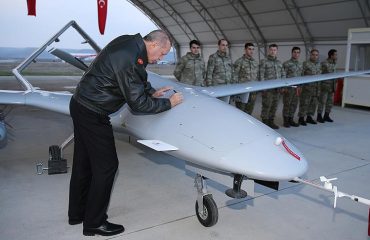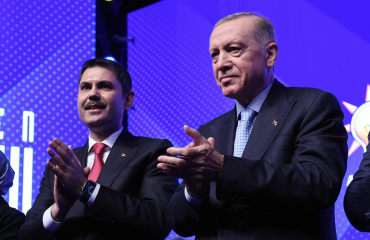

A plainclothes American soldier was attacked on September 2 by members of the youth wing of the nationalist Vatan Party (Homeland Party) in the western province of Izmir. They framed the attack as an “anti-imperialist” action and a retaliation for a 2003 incident in Iraq. However, critics dismissed the attack as shallow and juvenile, arguing it was neither comparable to a 1968 event nor an appropriate response to the 2003 incident. Who benefits from it?
Karl Marx had a poignant and apt observation: “History repeats itself, first as tragedy, second as farce.” The incident on September 2 in Konak Square, Izmir, where a plainclothes American soldier was attacked once again brought this saying to mind. The footage that gained quite a traction on social media showed an attacker throwing a plastic bag onto a victim’s head as the crowd chanted, “Yankee, go home!”
The Youth Union of Türkiye (Türk Gençlik Birliği, TGB) the youth wing of Doğu Perinçek’s nationalist-left Vatan Party (Homeland Party) claimed the attack. According to them, this was an “anti-imperialist action”.
They said that it is a retribution for the July 4, 2003 raid by US occupation forces on the Turkish observation unit in Sulaymaniyah, Iraq, which was stationed there in accordance with international agreements.
It’s also framed as a response to “US imperialism’s support of Israel’s oppression of the Palestinian people.”
Some supporters drew parallels to the 1968 incident when revolutionary youth threw US Sixth Fleet sailors from the aircraft carrier Shangri-La into the Bosphorus after they had docked near Dolmabahçe in Istanbul.
It was a key moment in Turkish political history. Critics, however, dismissed TGB members’ attack as shallow and juvenile, arguing it was neither comparable to the 1968 event nor an appropriate response to the 2003 incident.
We’ll compare it to both, but there’s another crucial detail to consider.
Why were US soldiers in Izmir?
According to the Izmir governorate’s statement, 15 individuals, including 2 women, were detained for “physically assaulting” two US soldiers and placing a plastic bag over one’s head. The US Embassy in Ankara reported that the attacked soldiers were “currently safe” and expressed gratitude to Turkish authorities for their swift intervention and initiation of an investigation.
The embassy’s statement about the İzmir incident include a significant detail. According to the statemen, the US soldiers on the shore leave in civilian attire in Konak were crew members from USS Wasp, amphibious assault ship anchored in Izmir. This attack brought this fact to light.
The USS Wasp had recently conducted joint military exercises with Türkiye’s first amphibious assault ship, TCG Anadolu, in international waters of the Eastern Mediterranean from August 13-17, accompanied by the Turkish frigate TCG Gökova. The Wasp’s presence was reportedly in response to potential Iranian retaliation following Israel’s assassination of Hamas leader Ismail Haniyeh in Tehran. When CHP’s Yankı Bağcıoğlu questioned why this information came from American sources rather than the Turkish Ministry of National Defense, the Ministry clarified that it wasn’t a planned exercise but a training activity. (You can read the details from here: Unraveling the undisclosed US-Türkiye naval exercise)
In essence, the American soldiers were guests of the government in Izmir, a city that also hosts the NATO Allied Land Command headquarters.
“If you can’t beat the donkey, beat the saddle”
This Turkish proverb aptly describes the Izmir incident, suggesting that when unable to confront the real source of frustration, people often lash out at easier targets.
Vatan Party leader Doğu Perinçek is a veteran politician who frequently appears on pro-AKP TV channels, primarily due to his harsh criticisms of the opposition CHP and Kurdish issue-focused DEM Party using nationalist, anti-imperialist rhetoric. Despite this media exposure, the party received a mere 52,720 votes in the May 14, 2023 elections – including 1,218 votes from abroad – amounting to just 0.07 percent of the total vote share. To put this in perspective, Galatasaray’s Seyrantepe stadium has a capacity of 52,600 people.
The TGB members involved in the Izmir action were undoubtedly motivated by genuine anti-imperialist sentiments. However, it’s somewhat naive to claim that this action “taught a lesson to US imperialism” or will have any significant impact.
Ironically, the USS Wasp’s presence in Izmir is a direct result of the AKP government fulfilling its alliance obligations with the US, even as it employs daily anti-US rhetoric – partly to deflect attention from the economic crisis – which resonates with a majority of the populace.
Sulaymaniyah and the Izmir incident
Comparing the Izmir incident to the 1968 Dolmabahçe-6th Fleet incident indeed brings Marx’s “tragedy and farce” quote to mind.
The Sulaymaniyah incident, where Turkish soldiers were arrested by American forces and had hoods placed over their heads remains one of the most humiliating episodes in Turkish military history. This US action, supported by intelligence from Talabani’s Patriotic Union of Kurdistan, was seen as retaliation for the Turkish parliament’s rejection of the AKP government’s request to support the invasion of Iraq from the north – the March 1 resolution.
Ankara chose not to retaliate, fearing further deterioration of US-Türkiye relations. In fact, following investigations by a joint Turkish-American military commission, three Turkish commanders involved in the “Hood Event” were retired, while their American CENTCOM counterparts were promoted. Notably, on January 27, 2015, then-Land Forces Commander General Hulusi Akar received the Pentagon’s Legion of Merit from Ray Odierno, one of the Sulaymaniyah commanders who later became US Army Chief of Staff.
Who benefits?
CHP’s Namık Tan speculated in a social media post on September 2 that had Türkiye not been expelled from the F-35 program due to President Erdoğan’s decision to purchase S-400 missiles from Russia, Turkish F-35s might now be conducting landing exercises on the TCG Anadolu instead of US V-22 aircraft.
With the upcoming US presidential election on November 5, Türkiye-US relations remain strained over the S-400 issue, compounded by the Syria-PKK and Israel-Palestine crises.
Interestingly, businessman Cavit Çağlar, who has facilitated some of Türkiye’s covert operations (such as the capture of Abdullah Öcalan and resolving the plane-shooting crisis with Russia), suggested to T24’s Cansu Çamlıbel that “If we sold the S-400s and got rid of them, all problems would be solved.”
Let’s conclude with Marx’s quote and the Turkish proverb, adding a Latin phrase inherited from the Roman Empire: “Cui bono? – To whose benefit?”
The Izmir incident appears to be a street action aimed at appealing to the nationalist sentiments of ordinary citizens. However, it also serves as an example that warrants closer examination to determine who truly benefits from such provocations.


